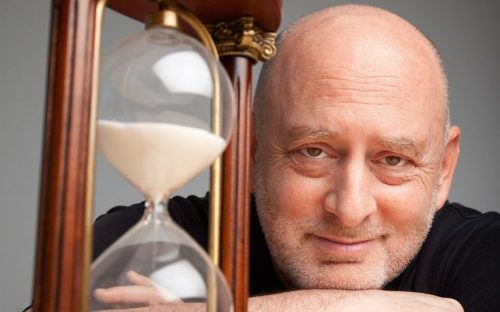
BY JUDY CARMACK BROSS
Alexander the Great searched the world for it. Chinese alchemist Ko Hung said he knew its secret 1700 years ago. In the 13th century, English scientist Roger Bacon recommended “secret arts of the past.” Ponce de Leon discovered Florida in his quest for the fountain of youth. And in Chicago, Phil Ponce of the Chicago Tonight Podcast and people of all ages are seeking the wisdom of University of Illinois gerontologist and researcher Jay Olshansky on prolonging a healthy lifespan.
Jay recently told members and guests of The Village Chicago, a nationwide movement dedicated to enhancing the quality of life as people live longer: “Science is on the verge of a breakthrough that will be even more significant than the discovery of vaccines. The whole idea is to compress the costs, frailties, and disabilities into a very short duration at the end of life, allowing you to be in a better place to enjoy your life.”

Jay Olshansky.
Researcher and author of thought-provoking articles such as “If Humans Were Built to Last” that was recently re-printed in Scientific American, Jay says that modulating aging in both his avocation and his occupation. Affable, vigorous, and able to translate current complex studies into simpler terms, Jay offers realistic solutions to those searching for that fountain of youth.
“The answer doesn’t lie with those who are promising that growth hormones and other drugs will allow people to live longer and longer. I call these entrepreneurs members of the second oldest profession. They try to make you believe that aging is somehow your fault and then they prey on you.”
Jay says that instead, the answer lies with researchers who are treating aging as a target for intervention.
“Most research has been around diseases related to aging. Now work with research on aging itself and its consequences is what is cutting edge. What are the interventions to modify the aging process itself? How can you feel healthier along the way? A byproduct would be that when you are 64, you will feel like you are 40, when you are 74, like you are 50. Now that’s way better.
“What is aging? It is accumulated damage to the building blocks of life that are overwhelmed by disease and other disorders. We can’t as yet modulate aging, but that is the goal as we look at the upper limits of human longevity and concentrate on a healthy lifespan.”
Jay, whose father lived to 96 and his mother to 90, says that first and foremost aging is about your genes.
“People who look younger are simply aging more slowly. I joke that if you want to live long, ask for longer-living parents. If you see a man of 70 and think that he doesn’t look a day over 50, ask to see a photo of his father at the same age.
“Conversely, we are aware of the sad story of Jim Fixx, the author and runner who died at a young age from the same type of massive heart attack that killed his father at an even younger age. Jim did prolong his death somewhat through running and a very healthy lifestyle.
“We do live in a body that is a machine, with our own variety of pulleys, pumps, and levers. It isn’t designed for long-term use, but we can use it a lot longer with diet and exercise and, of course, avoiding behavioral risks like excessive alcohol and smoking.”
A runner for 35 years who now enjoys walking and bicycling, Jay says he uses exercise as a reward.
“I finish the list of what I need to get done because I want to get to exercising. Of course you have to talk to your doctor about any exercise that might be damaging to your back or neck but really whether it is swimming, walking, gardening, or whatever, you just have to keep vertical, keep moving. Being horizontal is very difficult on your body. I try to do some kind of exercise five times a day.”
Jay says that his diet is key and that he has had the same breakfast for 20 years:
“I start with a handful of nuts, one ounce of my favorite cheese, a fig or date, and then some kind of fresh fruit. I have started eating more frequent and smaller meals. I eat food, not pills and supplements. It’s all about knowing how your body operates and what it likes and doesn’t like.”
In addition to his work at the School of Public Health at the University of Illinois at Chicago, Jay is a research associate at the Center for Aging at the University of Chicago where he first began his interest in gerontology as a graduate student in the late 1970s. He initially thought he wanted to concentrate on childhood issues. “My professor Bernice Neugarten, asked me to work on the concept of young-old and old-old, which she was developing, and I was hooked immediately,” Jay said.
The Village Chicago is offering a “buy-a-spot” dinner opportunity to talk with Jay, date to be determined, at the non-profit’s June 6 gala at the Theater on the Lake.
Visit thevillagechicago.org, under featured events, if you are interested in bidding or call 773-248-8700. For further information about Jay Olshansky, visit sjolshansky.com.







